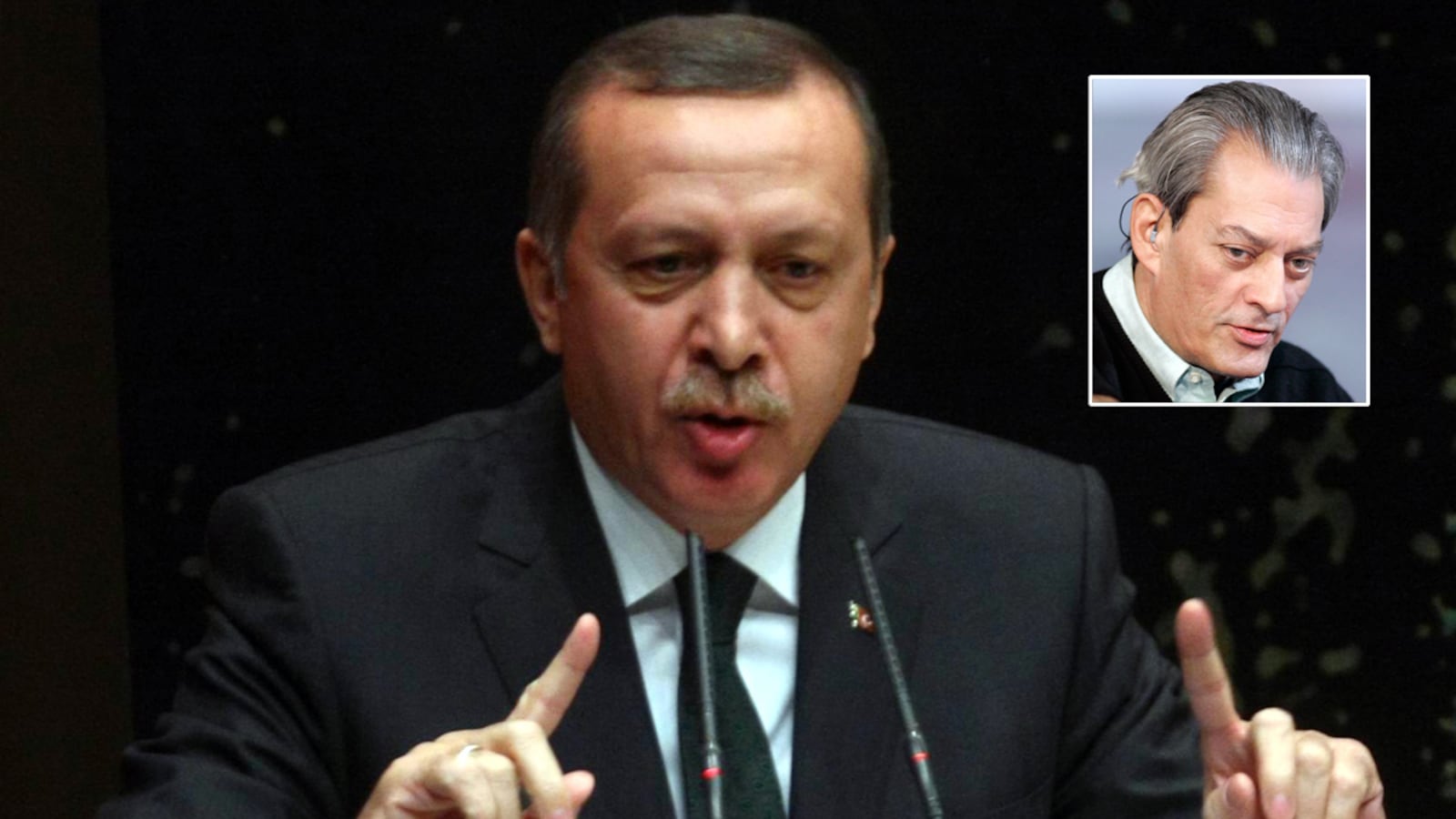Paul Auster’s latest memoir, Winter Journal, had its debut in Turkey last month, even before its publication in the United States. The book sold more than 20,000 copies on its release—a huge number for a translated work in Turkey. Auster is perhaps the most popular international writer in that country, with all his books translated into Turkish and selling well over the years. But as his loyal Turkish readers were getting their hands on Winter Journal, the Brooklyn writer found himself the latest target of Turkey’s hotheaded premier, Recep Tayyip Erdogan.
What ignited Erdogan’s fuming was a recent interview Auster gave to the daily Hürriyet in which the author said he refuses to visit Turkey “because of imprisoned journalists and writers.”
Not wasting a day, Erdogan responded to Auster in a party meeting, calling the author an “ignorant man.” He continued: “If you come, so what? If you don’t come, so what? Will Turkey lose prestige?” He took his criticism further by mentioning Auster’s past visit to Israel: “Supposedly Israel is a democratic, secular country, a country where freedom of expression and individual rights and freedoms are limitless. What an ignorant man you are. Aren’t these the ones that rained bombs down on Gaza? The ones that launched phosphorus bombs and used chemical weapons? How can you not see this?”
Following Erdogan’s remarks, Auster released a statement: “Whatever the prime minister might think about the state of Israel, the fact is that free speech exists there and no writers or journalists are in jail.” Auster followed that “in order to improve conditions in our countries, in every country, the freedom to speak and publish without censorship or the threat of imprisonment is a sacred right for all men and women.”
Israel bashing has long been a favorite theme of Erdogan’s politics, and Auster is the latest in a long list of culprits that Turkey’s charismatic yet authoritarian leader has picked and targeted over the past few years, including Turkey’s secular opposition parties, The Economist, the American ambassador to Turkey, and Nicolas Sarkozy. But Auster is the first international writer to have his share of Erdogan’s wrath—although he is no stranger to human-rights violations in Turkey. In Sunset Park, his most recent novel, he mentioned Article 301 in Turkish penal law, under which writers like Orhan Pamuk were charged with insulting “Turkishness.” In 1996 Auster himself, along with 143 other international writers, was called in to court to testify. They were involved in the publication of a book containing an article by dissident Turkish writer Yasar Kemal and were found “guilty” by the court.

Not much has changed in Turkey since 1996 in terms of freedom of speech. The running joke these days is to wonder whether Auster will stand trial in the ongoing investigation of Ergenekon, a group that allegedly plotted to overthrow the government in a coup involving ex–military officials, NGO leaders, and many intellectuals (including professors, journalists, and writers). The investigation has diverted from its original course and become a juggernaut to silence dissident voices. One pro-government Turkish daily, Zaman, went as far as to claim that international publications, such as Newsweek, Foreign Policy, and Reuters, were serving Ergenekon when they questioned the credibility of the trials. It did not take long for a columnist in Sabah, a newspaper owned by a company run by Erdogan’s son-in-law, to accuse Auster of being “misguided by the Ergenekon mentality.”
Actually, these days anyone can be accused of participating in the Ergenekon plot. Ahmet Sik, who has written two books investigating the group, is serving time in jail for allegedly being part of the very thing he was researching. The police even tried to prevent the release of his last book by deleting the manuscript from several computers upon his arrest. Although his book was finally published with the efforts of his friends, he has been serving time in jail for almost a year now.
He is one of the 13 journalists who are going to stand yet another trial on March 12. Although Auster refuses to go to Turkey, this may be the perfect opportunity for his visit.
Kemal Kilicdaroglu, the leader of Turkey’s main opposition party, has extended an official invitation to the author and asked him to give a speech on human rights and press freedom. Many of Turkey’s writers are also backing Auster. “He’s underlining a fact which we are very well aware of,” said novelist Müge İplikci in the daily Milliyet. “Our government is in no position to speak about democracy, justice, or freedom when there are more than 100 journalists in jail.”
In the mid-’80s Arthur Miller and Harold Pinter, who were then on the board of PEN, as Auster is now, arrived in Turkey to follow the trials of dissident writers who stood against the military rulers. Today military rule is no longer present, but the long tradition of persecuting writers and journalists continues. Auster’s possible appearance in court among the friends and relatives of the accused would be a symbolic and powerful act of support for the pursuit of press freedom in Turkey.
But there is no guarantee that a special prosecutor will not arbitrarily tie his name to an ongoing criminal investigation!






